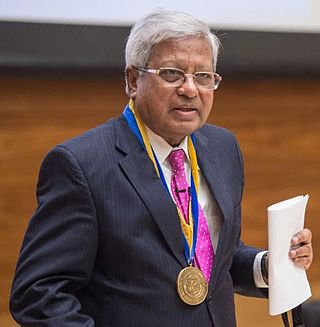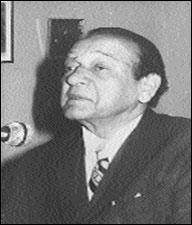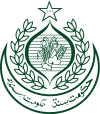Related Research Articles

Syed Sajjad Ali Shah was a Pakistani judge who served as the 13th Chief Justice of Pakistan from 4 June 1994 to 2 December 1997. He had been appointed as Chief Justice of the Supreme Court by Benazir Bhutto. Prior to that, he served as the 6th Chief Justice of Sindh High Court from 13 December 1989 to 4 November 1990.

Ishrat Husain is a Pakistani civil servant who served as governor of the State Bank of Pakistan from 1999 to 2006, dean of the Institute of Business Administration from 2008 to 2016, and advisor to the Prime Minister on Institutional Reforms and Austerity from 2018 to 2022.

Sir Fazle Hasan Abed was the founder of BRAC, one of the world's largest non-governmental organizations.

Bashir Khan Qureshi was a Sindhi nationalist who served as the leader of Jeay Sindh Qaumi Mahaz (JSQM), a Sindhi nationalist movement in Sindh, founded by G. M. Syed. He was assassinated with slow poison at the age of 54 years on 7 April 2012.

Agha Shahi, NI, was a Pakistani career Foreign service officer who was the leading civilian figure in the military government of former President General Zia-ul-Haq from 1977 to 1982. A diplomat and technocrat by profession, he joined Foreign Services in 1951 and held important diplomatic assignments in the United States, China, and the United Nations. He served as the Foreign secretary— the leading bureaucratic position in Pakistan Government— in 1973 until 1977, after Zulfikar Ali Bhutto's government was dismissed.
Masuma Hasan is a Pakistani civil servant, diplomat, and scholar who serves as Chairman of The Pakistan Institute of International Affairs and President of the Board of Governors of Aurat (Women's) Foundation. In her public service career, she rose to the position of Cabinet Secretary, the highest post in the civil service. She was Pakistan's Permanent Representative to the United Nations Office in Vienna (UNOV), where she chaired the Group 77 nations, and was the first woman faculty member to head a management and consultancy organization in the public sector. Her struggle to make a place for herself in the patriarchal administrative and political system in her country has become a landmark in the larger movement for gender equality and women's rights.
Ahmed Hussain A. Kazi Tamgha-e-Pakistan Award was a civil servant of Pakistan and senior advocate of the Pakistan Supreme Court, who shaped the internal revenue, economic and industrialization policies during the 1970s.

The Institute of Business Management (IoBM) is a private university and business school in Karachi, Pakistan. IoBM is composed of four colleges, the College of Business Management (CBM), the College of Economics and Social Development (CESD), the College of Computer Science and Information Systems (CCSIS) and the College of Engineering Sciences (CES).

Aftab Ghulam Nabi KaziSPk, SK, also known as AGN Kazi, was a Pakistani civil servant and a bureaucrat during the Cold War and during the post cold war. Kazi was born in Sindh, Bombay Presidency, in 1919 to an academic family. He started his career in the Indian Civil Service in 1944 and served as the Deputy Commissioner of Bihar and Orissa. After the partition of India, Kazi migrated to Pakistan and joined the Provincial Government of Sindh, and held positions such as Secretary of Finance and Secretary to the Governor.

Karachi's educational system is divided into five levels: primary ; middle ; high ; intermediate ; and university programs at undergraduate and graduate level.

The Pakistan Administrative Service, or PAS is an elite cadre of the Civil Services of Pakistan. The Pakistan Administrative Service over the years has emerged as the most consolidated and developed post-colonial institution in Pakistan, with the PAS officers of Grade 22 often seen as stronger than the federal government ministers. The service of PAS is generalist in nature and officers are assigned to different departments all across Pakistan during the course of their careers. Almost all of the country's highest-profile positions such as the Federal Secretaries, the provincial Chief Secretaries, and chairmen of top-heavy organizations like the National Highway Authority, Trading Corporation of Pakistan and State Life Insurance Corporation usually belong to the Pakistan Administrative Service.
Hamid Ali Mirza was a Pakistani lawyer. He served as Judge of the Supreme Court of Pakistan and Chief Election Commissioner of Pakistan.

Syed Hashim Raza was a leading bureaucrat and former Governor of East Pakistan.

Rizwan Ahmed is a former grade 22 officer of the Pakistan Administrative Service who served at the highest civil service office of Federal Secretary to the Government of Pakistan. He is currently a Member of Sindh Public Service Commission for a four-year term. Rizwan did his two-year Masters in Public Administration from Harvard University and holds the rare distinction of having served as the chief executive of four state-owned organisations under the Government of Pakistan, the most by any individual in history at the federal level.

Grade-22 is the highest attainable rank for a Civil Servant in Pakistan. Grade 22 is equal to a 4-star rank of the Pakistan Armed Forces. With over five hundred thousand civil servants and bureaucrats in Pakistan, only a few dozen officers serve in BPS-22 grade at a given time. Hence, not even 1% of the country's civil servants and/or bureaucrats make it to the highest rank. Officers serving in BPS-22 grade are largely considered to be the most influential individuals in the country.
Sajjad Saleem Hotiana is a retired Pakistani civil servant who served in BPS-22 grade as Chief Secretary Sindh. Hotiana also served as Chief Secretary Gilgit Baltistan and Senior Member Federal Land Commission. After retirement from active civil service, he tenured as Member of Punjab Public Service Commission (PPSC). He is civil service batchmates with Babar Yaqoob Fateh Muhammad, Shehzad Arbab and Tariq Bajwa.

Nisar Ahmed Siddiqui was a renowned Pakistani academic, educationist, reformer, founding vice chancellor of Sukkur IBA University & former bureaucrat from Sindh, Pakistan.

Mumtaz Ali Shah is a retired Pakistani civil servant who served in BPS-22 grade as the Maritime Secretary of Pakistan and Chief Secretary Sindh. Hailing from Sindh, Shah joined the Pakistan Administrative Service after passing the Central Superior Service examination in 1984.
Syed Ghulam Mustafa Shah [(Sindhi: سيد غلام مصطفيٰ شاھ), 18 October 1918 – 9 October 1999] was a scholar, educationist and academic leader from Sindh, Pakistan. He served as Vice Chancellor of Sindh University Jamshoro and Federal Education Minister of Pakistan. He was founder of "Shah Abdul Latif Cultural Society" and launched the scholarly Journal "Sindh Quarterly".
References
- 1 2 3 4 5 "IoBM founder Shahjehan Syed Karim passes away at 84". The Express Tribune. 17 July 2017.
- ↑ "IoBM founder Shahjehan Syed Karim passes away".
